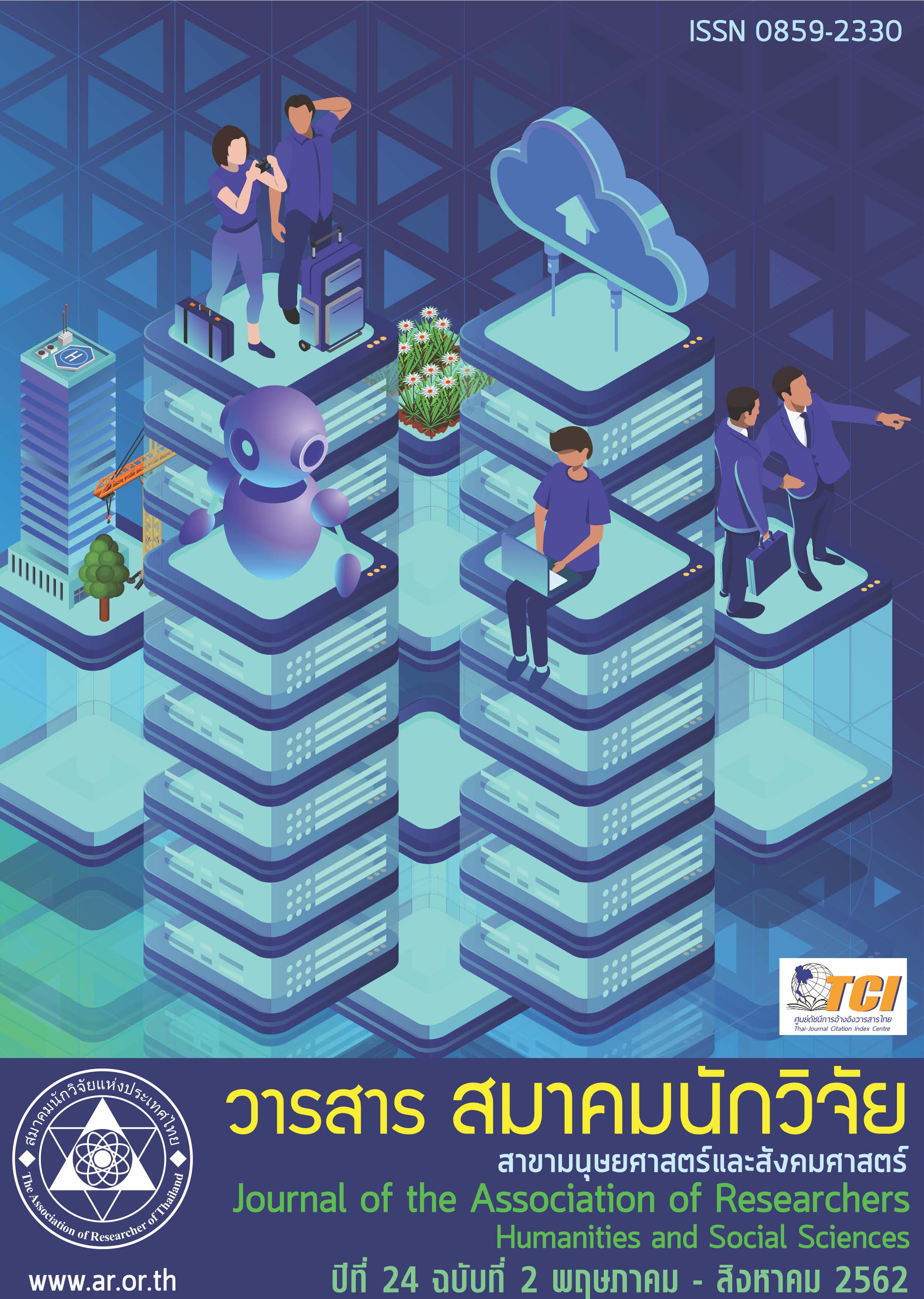The Development of Relational Self-esteem Scale
Main Article Content
Abstract
There are few studies have been conducted to explore the relational self-esteem in Thailand. This research aims at developing a relational self-esteem measurement adapted from Du, King, & Chi (2012). Study 1 purposed to analyze the confirmatory factor, two hundred and fifty-eight university students completed the relational self-esteem scale. The result shows high internal consistency, Cronbach’s alpha of .79. In addition, results from the confirmatory factor analysis showed good fit. Study 2 aimed to examine the concurrent validity, one hundred and fifty university students completed the relational self-esteem scale and the personal self-esteem scale. Concurrent validity was confirmed, i.e. relational self-esteem positively related with personal self-esteem.
Article Details
บทความที่ปรากฏในวารสารนี้ เป็นความรับผิดชอบของผู้เขียน ซึ่งสมาคมนักวิจัยไม่จำเป็นต้องเห็นด้วยเสมอไป การนำเสนอผลงานวิจัยและบทความในวารสารนี้ไปเผยแพร่สามารถกระทำได้ โดยระบุแหล่งอ้างอิงจาก "วารสารสมาคมนักวิจัย"
References
Brewer, M. B. & Gardner, W. (1996). Who is this ‘‘we’’? Levels of collective identity and self- representations. Journal of Personality and Social Psychology, 71, 83–93.
Cross, S., Bacon, P. & Morris, M. (2000). The relational-interdependent self-construal and relationships. Journal of Personality and Social Psychology, 78, 791–808.
Du, H., King, R. B., & Chi, P. (2012). The development and validation of the Relational Self-Esteem Scale. Scandinavian Journal of Psychology, 53, 258-264.
Du, H., Li, X., Chi, P., Zhao, J., & Zhao, G. (2015). Relational self-esteem, psychological well-being and social support in children affected by HIV. Journal of Health Psychology, 20, 1568-1578.
Du, H., Li, X., Chi, P., Zhao, J., & Zhao, G. (2018). Psychometric properties of the Relational Self-Esteem Scale in a community-based sample in China. European Journal of Psychological Assessment, 34, 154-161.
Faul, F., Erdfelder, E., Lang, A. G., & Buchner, A. (2007). G*Power 3: A flexible statistical power analysis for the social, behavioral, and biomedical sciences. Behavior Research Methods, 39, 175-191.
Hair, J. F., Black, W. C., Babin, B. J., & Anderson, R. E. (2010). Multivariate data analysis (7th ed.). Upper Saddle River, New Jersey: Prentice Hall.
Harter, S., Waters, P. & Whitesell, N. R. (1998). Relational self-worth: Differences in perceived worth as a person across interpersonal contexts among adolescents. Child Development, 69, 756–766.
Heine, S. J., Lehman, D. R., Markus, H. R., & Kitayama, S. (1999). Is there a universal need for positive self-regard? Psychological Review, 106, 766–794.
Hofstede, G. (2001). Culture’s consequences: Comparing values, behaviors, institutions and organizations across nations (2nd ed.). Thousand Oaks, CA: Sage.
Kitayama, S., & Uchida, Y. (2003). Explicit self-criticism and implicit self-regard: Evaluating self and friend in two cultures. Journal of Experimental Social Psychology, 39, 476–482.
Kline, R. B. (2011). Principles and practice of structural equation modeling (3rd ed.). New York: Guilford Press.
Luhtanen, R. & Crocker, J. (1992). A collective self-esteem scale: Self-evaluation of one’s social identity. Personality and Social Psychology Bulletin, 18, 302–318.
Markus, H. & Kitayama, S. (1991). Culture and the self: Implications for cognition, emotion, and motivation. Psychological Review, 98, 224–253.
Neff, K. D. & Suizzo, M. A. (2006). Culture, power, authenticity and psychological well-being within romantic relationships: A comparison of European American and Mexican Americans. Cognitive Development, 21, 441–457.
Oyserman, D., Coon, H. M., & Kemmelmeier, M. (2002). Rethinking individualism and collectivism: Evaluation of theoretical assumptions and meta-analyses. Psychological Bulletin, 128, 3-72.
Rosenberg, M. (1965). Society and the adolescent self-image. Princeton, NJ: Princeton University Press.
Rosenberg, M. (1979). Conceiving the self. New York: Basic Books.
Schmitt, D. P., & Allik, J. (2005). Simultaneous administration of the Rosenberg Self-Esteem Scale in 53 nations: Exploring the universal and culture-specific features of global self-esteem. Journal of Personality and Social Psychology, 89, 623–642.
Wongpakaran, T. & Wongpakaran, N. (2012). A Comparison of Reliability and Construct Validity between the Original and the revised version of the Rosenberg Self Esteem Scale. Psychiatry Investigation, 9, 54-58.


